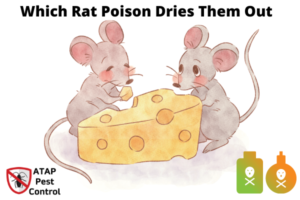Atap Exterminators are the best rat exterminator in Chicago. For more information, call .
If you have rats in your home and don’t want to pay an exterminator, employing rat poison may seem like the best option. However, imagine you apply rat poison and notice a foul odor emanating from somewhere in your home a few days later.
It turns out that the rat poison was adequate, but now you’re faced with another, more heinous, issue. There is a decomposing rat carcass someplace in your house that you must remove before it spreads disease.

Rat Poison that Kills Without Odor
You require rat poison that is odorless and non-toxic to people and other animals. To avoid the rat poison doing more harm than good, you must circumvent natural animal decomposition, which requires understanding what causes a dead carcass to decay in the first place. How to Effectively Use Rat X.
To utilize Rat X efficiently, it must be the only food supply available to the rats. Other food should not be left out and should be kept away from areas where other animals might eat it. The product is most effective when combined with different types of bait, like peanut butter.
Spread it along walls in areas where you know rats congregate and consume food. Keep rat poison and traps out of plain sight; little rodents prefer dark corners and recessed areas over big open spaces. RatX is one of the most effective and environmentally friendly rat poisons available. Not only that, but it virtually eliminates the issue of a dead rat causing a foul odor throughout your home.
When an animal dies, its body provides a breeding ground for saprophytic bacteria, which feed on decomposing matter. It occurs primarily for two reasons. First, the animal’s natural immune system can no longer combat these microorganisms. Second, most animals, including humans, have a body composed primarily of water, which provides an ideal breeding environment for these bacteria. They produce the terrible odor of decomposition as they feed and interact with the environment—contact atap exterminators for best services.
To deal with this aspect of nature, you must mummify the corpse. No, we’re not talking about bandaging it and burying it in a desert pyramid; we’re talking about completely dehydrating it and depriving the germs of their necessary environment.
RatX: How Does It Work
A company developed Rat X, a rat poison. They believe in using all-natural products and procedures to control rodents and other pests without endangering your pets or children if the product is consumed. It is prepared from veggies and grains that contain no toxins. They work by interfering with the digestive system of the rodent.
Mice and rats have a digestive tract that functions differently than that of the majority of other mammals. The tissue of the lower intestines is covered in tiny hairs called villi. RatX works by covering these villi and interfering with the neurological system of the rodent. Due to the disturbance caused by sodium chloride, the rat loses the desire to drink water.
It results in dehydration. Without sufficient water, the nervous system cannot adequately transfer impulses, the blood becomes thick, and tissues die. After a few days of lethargy and slumber, the rodent dies.
Following death, the RatX that remains in the digestive system rapidly absorbs all remaining water, causing the body to dehydrate and mummify. It will not eradicate the odor of decomposition, but it will significantly diminish it. The website claims that the stink is reduced by 90%. If you still wish to locate and remove the rat, you may do so, but the odor will be significantly less evident while using RatX.
Why is RatX considered safe?
It is safer for cats, dogs, and other animals than for rodents, owing to the rodent’s digestive system. Many questions arise in your mind whenever you think about rat poison. Which rat poison dries them out?
Even if a dog or cat ate one of the pellets, it would be unharmed. For one thing, a single pellet would be insignificant in the eyes of a vast dog or cat. Another reason is that there is no poison, and the shell does not react with the pet’s digestive tract in the same way as a rat or a mouse would. RatX rat poison is without odor.
Rat Poison Symptoms in Humans
Humans do not immediately exhibit symptoms of rat poisoning. There may be no symptoms in other circumstances. If a person is unaware they have taken rat poison, they may face symptoms with another illness.
Symptoms of rat poisoning in humans include the following:
- Anticoagulants: Bruising of the gums, nose, or skin. Lightheadedness, shortness of breath, discomfort, nausea, and vomiting are all symptoms of internal bleeding. Signs may be subtle, particularly in children.
- Bromethalin: irritable bowel syndrome or impaired mental status. Visual, behavioral, or cognitive difficulties, headaches, disorientation, vomiting, lethargy, or loss of consciousness are all symptoms of cerebral edema (brain swelling).
- Dehydration, severe thirst, and increased urination are all side effects of cholecalciferol. Without quick treatment, exposure can result in heart and kidney damage.
- Vomiting, agitated behavior, chills, convulsions, shortness of breath, and coma are all symptoms of zinc phosphide. Zinc phosphide inhalation can cause anxiety and difficulties breathing.
- Strychnine: Seizures and muscle spasms. Within 15 minutes, symptoms might manifest and intensify until breathing becomes difficult.
